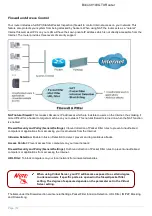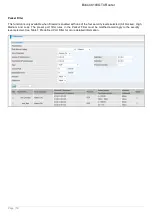
Billion 810VGTX Router
Page | 66
Intrusion Detection
The router Intrusion Detection System (IDS) is used to detect hacker’s attacks, and intrusion attempts from the Internet.
If the IDS function of the firewall is enabled, inbound packets are filtered and blocked depending on whether they are
detected as possible hacker attacks, intrusion attempts or other connections that the router determines to be suspicious.
Blacklist: If the router detects a possible attack, the source IP or destination IP address will be added to the Blacklist.
Any further attempts to use this IP address will be blocked for the time period specified in the Block Duration. The default
setting for this function is false (disabled). Some types of attacks are denied immediately without using the Blacklist
function, such as Land attack and Echo/CharGen scan.
Intrusion Detection: If enabled, IDS will block Smurf attack attempts. Default is ‘Disable’
Block Duration:
Victim Protection Block Duration: This is the duration for blocking Smurf attacks. Default value is 600
seconds.
Scan Attack Block Duration: This is the duration for blocking hosts that attempt a possible Scan attack. Scan
attack types include X’mas scan, IMAP SYN/FIN scan and similar attempts. Default value is 86400 seconds.
DoS Attack Block Duration: This is the duration for blocking hosts that attempt a possible Denial of Service
(DoS) attack. Possible DoS attacks that are blocked include Ascend Kill and WinNuke. Default value is 1800
seconds.
Max TCP Open Handshaking Count: This is a threshold value to decide whether a SYN Flood attempt is occurring or
not. Default value is 100 TCP SYN per seconds.
Max PING Count: This is a threshold value to decide whether an ICMP Echo Storm is occurring or not. Default value is
15 ICMP Echo Requests (PINGS) per second.
Max ICMP Count: This is a threshold to decide whether an ICMP flood is occurring or not. Default value is 100 ICMP
packets per second except ICMP Echo Requests (PING).
For SYN Flood, ICMP Echo Storm and ICMP flood, IDS will just warn the user in the Event Log. It cannot protect against
such attacks.
















































